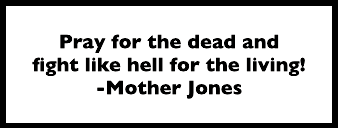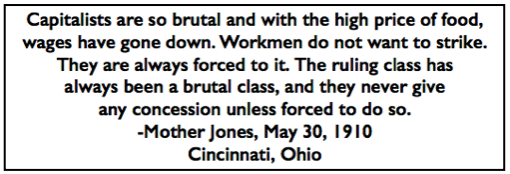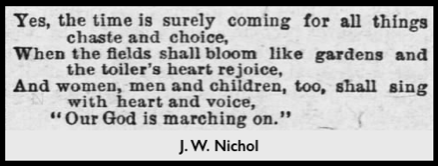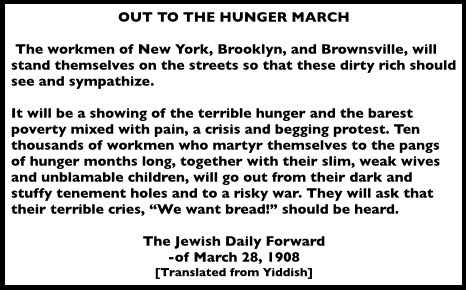 —————
—————
Hellraisers Journal – Friday January 29, 1904
Pennsylvania and Colorado – Hundreds of Newly Made Widows and Orphans
From The Rocky Mountain News of January 27, 1904:
 —————
—————
Hellraisers Journal – Friday January 29, 1904
Pennsylvania and Colorado – Hundreds of Newly Made Widows and Orphans
From The Rocky Mountain News of January 27, 1904:
 —————
—————
Hellraisers Journal – Tuesday June 25, 1912
“Bread” by Ryan Walker
From The Coming Nation of June 22, 1912:
Continue reading “Hellraisers Journal: From The Coming Nation: “Bread” by Ryan Walker”
 ———-
———-
Hellraisers Journal – Friday July 8, 1910
“The Wolf at the Door” -Poem by Charlotte Perkins Gilman
From The Progressive Woman of July 1910:
Not yours the victor’s meed of praise,
When Freedom leads her hosts to war,
For even in these evil days
Her fighters grow from more to more.
-Michael Schwab
~~~~~~~~~~~~~~~~~~~~~~~~~~~~~~~~~~~~~~~~~~~~~
Hellraisers Journal – Sunday October 2, 1898
“From More to More” by Michael Schwab
From the London Social Democrat of October 1898:

~~~~~~~~~~~~~~~~~~~~~~~~~~~~~~~~~~~~~~~~~~~~
Hellraisers Journal, Monday July 4, 1898
Poetry by J. W. Nichol: “God Is Marching On”
From the Appeal to Reason of July 2, 1898:

Hellraisers Journal: Monday April 13, 1908
New York, New York – Robert Hunter Blamed for Bombing
The unemployed, and those who stand up for them, are to blame for a bomb thrown by a murderous criminal unconnected with them, this according to the Police Force of New York City. The actual crime of the protesting unemployed men, women and children was, apparently, their failure to starve silently and in an orderly manner.
From the Appeal to Reason of April 11, 1908:
Robert Hunter.
—–
In his address to the public following the breaking up of the meeting of the unemployed in Union Square, New York, Police Commissioner Bingham assumed an insolent and pompous attitude toward the working class. He served notice that the was going to deal with such meetings hereafter with an “iron hand.” We have heard such talk before. There is nothing in it.
Bingham goes on to defend the police. Of course. The police acted under his orders. Thousands of eye-witnesses declare that the police acted with unspeakable brutality in riding rough shod over the people and clubbing them without mercy. Hundreds who were unable to escape from the crowd bear the marks of the outrageous and unprovoked assaults of the police hirelings. Of course the police were not to blame, and of course Bingham comes to their rescue and defends them. The police were the mere tools in the hands of such politicians as Bingham.
Among other things, Bingham took occasion to misrepresent Comrade Robert Hunter and place him in a false light before the people. We happen to personally know Comrade Hunter and to have known him from his childhood. There is no gentler, kindlier, more considerate soul. Nor at the same time one more courageous. His heart throbbed in sympathy with the thousands of the unemployed. With all the passion of his noble nature he yearned to serve them, to comfort them. And so he was to speak to them on that fateful day when the blue-coated Cossacks swooped down upon the hungry hordes and scattered them with as little mercy as if they had been so many tarantulas. Robert Hunter did not speak. He had no chance to speak. But he was blamed for the trouble because he sympathized with the unfortunates; because he did not have a heart of stone.

Hellraisers Journal, Monday March 14, 1898
From the Salvation Army: A Picture of Poverty in America
From the Appeal to Reason of March 12, 1898:
A SHAMEFUL PICTURE.
Comrade Booth, of the Salvation Army gives us some facts that ought to make the “greatest country in the world” ashamed of itself. Read this and wonder no longer why socialism is growing:
The pauper world-there’s a world for you! A world with starvation. Then the vicious world, the gambler and the harlot. Last the criminal world-why, in this country alone there are 80,000 men and women who are behind bars. These are the three worlds in which our work lies. We have 415 different institutions, ninety of which are at work in the United States. We feed 250,000 hungry men, women and children every night and shelter 13,000 ragged men and women, of which 4,500 are in the United States. On cold nights the figures sometimes double. We give them hot and cold water with which to wash, and if the person is afflicted with those strange little pests-unknown, of course, in Denver-we furnish crematories for them. While the poor fellow is taking a bath we bake his garments, so that if he comes in 20,000 strong he goes out one single personality. In addition to this we furnish him with a rousing salvation meeting and give him something to think about. If a man falls we offer a hand to help him onto his feet again. We have sixty-nine institutions for the rescue of young girls. Talk of pity! Am I not talking to a people who are sending pity to that island Cuba? Yet in their midst they have objects of pity.

~~~~~~~~~~~~~~~~~~~~~~~~~~~~~~~~~~~~~~~~~~~~
Hellraisers Journal, Thursday January 16, 1908
Monongah, West Virginia – Hunger Reigns with Breadwinners Dead
Who among us could ever forget the following from journalist Dorothy Dale reporting from the devastated town after the great mine disaster:
Please letta me work, lady; gotta getta money…Please you get something for me, I can do.
A little hand touched my arm. The curl-framed face of a girl of 10 years looked into mine.
[She said pitifully:]
You know mans all dead. Boys all dead. Only girls left to work.
From The Labor World of January 11, 1908:
WIDOWS AND ORPHANS CRYING FOR BREAD
—–
Entire Burden of Every Industrial Disaster Falls
Upon the Poor Wage-earners’ Family.
—–
Bread Winners Killed By Wilful Negligence of
Their Employers, the Union Smashers.
—–
In the appeal issued by the Monongah Relief Committee it is stated that of the 3,000 inhabitants of Monongah the mine disaster destroyed one-half of the breadwinners. Two hundred and fifty wives, 1,000 children and many unborn children are left without means of support. The company has declared that the families occupying these houses may remain in them until other provision is made for them and in other ways has been generous in its attitude, but it states that operations cannot be resumed at the damaged mines until these houses are available for the new force. $200,000 is asked for by the Relief Committee to meet these needs. Commenting on the situation Paul U. Kellogg, special representative of Charities and The Commons, says:
The mine owners did not find the gold,
They did not mine the gold,
They did not mill the gold,
But by some weird alchemy
All the gold belonged to them!
-Big Bill Haywood
Hellraisers Journal, Monday December 31, 1917
New York, New York – Kept Press Waxes Hysterical on Big Bill
From the New York Tribune of December 30, 1917:
The article, authored by Theodore Knappen, is a long one and describes Fellow Worker Haywood’s long history of service to the working class as an effort to seek “the destruction of the existing system of government and industry by means of direct action.”
Interesting that the same author seems to hold no such outrage for the enslavement of children in mine and mill, for the thousands of men who perish each and every year in the mines, for the strikers and their wives and children murdered at Ludlow, Calumet, Roosevelt and other scenes of massacres too numerous to mention, nor for the millions thrown onto the scrap heap to face homelessness and starvation when they can no longer work or find work. One might conclude that such an “existing system” deserves to be replaced with a system which honors and respects the working men, women and children who provide the labor that keep it running.
If blood be the price of your lawful wealth
Good God! we have bought it fair.
-Unknown Proletarian
Hellraisers Journal, Wednesday May 23, 1917
Worldwide – Hunger Rules the Earth
From the International Socialist Review of May 1917:
Hunger by C. D. Batchelor